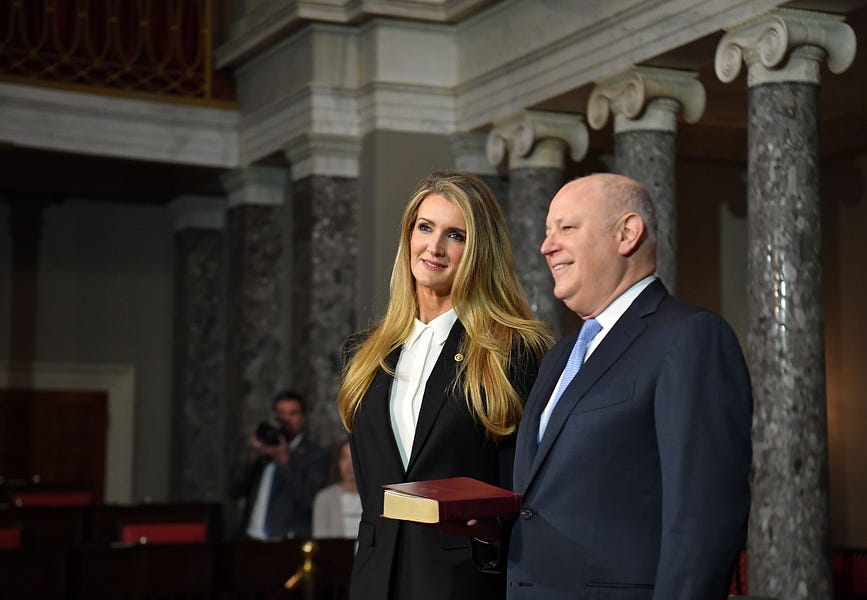Bernie Sanders is now the definitive front-runner for the Democratic nomination with an ambitious list of policy goals–including Medicare for All–that would require legislative action to implement.
But right now Republicans hold a narrow three-seat majority in the Senate plus the tie-breaking vote of the vice president. What would need to happen for Democrats to take over the upper chamber this cycle?*
First, let’s look at which states are in play. Two Democratic incumbents face tough re-elections—Gary Peters in Michigan and Doug Jones in Alabama. Peters currently holds a slim polling lead against his most likely Republican rival, but Jones is lagging by considerably more in Alabama. Jones, who beat Roy Moore by one point in a special election in 2018, voted to remove Trump from office during the impeachment trial despite his state’s +23 net approval of the president. It looks like Tommy Tuberville and Jeff Sessions will battle it out in a runoff to determine who will run against Jones in the general, but either one would be a heavy favorite to win in November.
This means that Democrats most likely need four pickups and the presidency (or five seats if Trump wins re-election) to take the senate, but that’s not an impossible feat. And we may not know until January 2021.
Three Republican senators are in “toss-up” races—Martha McSally in Arizona, Cory Gardner in Colorado, and Susan Collins in Maine. Current polls show McSally and Gardner both down and Collins appears tied in Maine. Democrats would need to win all of these to stand a realistic chance of winning the chamber.
So what about the fourth (and maybe fifth) seat? North Carolina, Georgia (there are TWO races here), and Kansas look like the best bets today.
Let’s look at them one at a time.
North Carolina: Thom Tillis
In 2014, Thom Tillis unseated Democratic incumbent Kay Hagan in a one-point race. Trump won the state by a narrow margin two years later, and Tillis has since voted with the president more than 90 percent of the time.
But as longtime GOP-operative and North Carolina native Doug Heye put it, “we’ve often said that Republicans may have a problem in the primary if they cross Trump, but the reality is they would have a problem in the primary and the general.” Heye was in North Carolina the day after the Access Hollywood tape came out in 2016 and went to some campaign events for Senator Richard Burr. He noted that Burr “clearly did not like the language from Trump, but also knew that walking away completely from him would collapse the base—that’s why you see so many Republicans joined at the hip with Trump.”
When it comes to Tillis, a former North Carolina state party communications director and RNC strategist pointed to Tillis’ 2014 performance as a road map forward. In 2014, “Thom played perpetual offense … transformed into a political Patrick Mahomes — every time he got the opportunity to score, he put touchdowns on the board with swing voters,” he remembered. “The challenge that most incumbents face is that they revert to playing defense,” he said, “they are reactive instead of proactive [but] Tillis should be in strong shape if he replicates his Mahomes’ mentality.”
Even so, at least one poll has Tillis’ likely challenger a couple points ahead despite his relatively low name recognition this early in the race. The president’s approval rating in the state is in the red, and another poll shows Trump trailing Biden, Bloomberg, and Sanders.
But Republican operatives who know the state are still feeling bullish. In 2016, incumbent Burr outperformed Trump by a few thousand votes, which to at least one former NC operative means that “if Tillis has consulted with colleagues like Rob Portman and Richard Burr to replicate their masterfully efficient 2016 operations, he should find himself as the bettors’ favorite to return to the Senate.”
Georgia: Perdue and Loeffler
It’s the full employment act for political consultants in Georgia this cycle. Republican Sen. David Perdue is up for re-election, but in an unusual twist, the other Senate seat, currently held by governor-appointed Kelly Loeffler, is also up in a special election because of Sen. Johnny Isakson’s retirement last year.
President Trump’s approval rating sits exactly split in Georgia, signaling a big opportunity for Democrats. But Democratic donors have every reason to feel burned. In 2017, Jon Ossoff spent nearly $30 million to succeed Tom Price in the most expensive House race in U.S. history, only to lose to Karen Handel by 5 points. And then the next year, Democrats plowed another $42 million into the governor’s race in 2018 only to see Stacey Abrams barely lose to Brian Kemp.
Perdue has a few things going for him as well, according to one well-placed political operative in Georgia I spoke with. To start with, Stacey Abrams declined to get into the race—presumably eyeing a spot at the top of the ticket with the eventual Democratic presidential nominee. He started the race with close to $8 million in the bank, which is always helpful. And his favorability has consistently hovered at around 50 percent despite voting with the president 95 percent of the time.
More good news for Georgia Republicans? The Democratic field against Perdue is split and the primary isn’t until May 19. If none of his would-be-opponents—like Jon Ossoff—get over 50 percent, there’s a runoff nine weeks later. This means the Democratic nominee may not be decided until late July, which is a tough spot for any challenger who needs to raise money and name recognition all while competing for attention against a presidential race at the top of the ticket.
Of course, if Stacey Abrams does end up as the vice presidential candidate, all bets are off and Democratic turnout in Georgia would almost certainly increase in November.
And then there’s the mess that is the second seat.
The most important thing to know is that it’s a weird election process: Every candidate—Republicans and Democrats—runs on the November ballot and if no candidate receives more than 50 percent, there’s a runoff in January 2021. That’s a long way off.
On the Republican side, Gov. Brian Kemp, bucking Trump and some very public pressure from his allies to appoint Doug Collins, instead appointed business executive and political newcomer Kelly Loeffler to the seat after Isakson was forced to retire for health reasons. Collins, prominent Trump defender and top Republican on the House Judiciary Committee, announced his campaign as well, despite McConnell’s Senate Leadership Fund, the National Republican Senatorial Committee, and even the conservative Club for Growth backing Loeffler. For his part, Collins isn’t pulling any punches, already attacking Loeffler on Twitter for her choice of pants. Collins also turned down Trump’s offer to appoint him to his Cabinet as director of national intelligence last week, causing at least one Georgia Republican to quip, “day by day, Doug Collins looks to be carving a personal spot into the Mt. Rushmore of bad political calculations.” But there’s still the lingering question of whether Trump will buck McConnell and endorse Collins.
On the Democratic side, the Democratic Senate Campaign Committee and Stacey Abrams have endorsed Rev. Raphael Warnock, head of Atlanta’s historic Ebenezer Baptist Church. But he’s joining Matt Lieberman, son of former Connecticut Sen. Joe Lieberman, and Ed Tarver, former Obama administration U.S. attorney, in the race.
All of this adds up to one thing: This race almost certainly isn’t getting decided until January.
Kansas: Open
This is the race to replace Pat Roberts, who announced that he would not run for a fifth term in the Senate. Not surprisingly, there are plenty of folks from both sides of the aisle eager to take his place. While the race is still characterized as “leans Republican” by most handicapping websites, it’s still expected to be closer than it would have been had Secretary of State Mike Pompeo, with high name recognition and access to deep donor pockets, decided to throw his hat in the ring.
The primaries on both sides are bound to be messy, but at least one internal GOP poll from the fall showed why this race has Republicans reliving their Roy Moore and Todd Aiken nightmares. In it, Republican firebrand and immigration hard-liner Kris Kobach trailed 10 points behind one potential Democratic candidate. But just last week, Kobach released internal polling showing his campaign with a double digit lead against his Republican rivals in the primary and another which showed him beating the now-likely Democratic nominee.
But as one Kansas Republican strategist told us, as long as “Kobach is not the nominee, Republicans keep the seat.” In many ways, that puts the ball in Mitch McConnell’s court to convince the president that the Republican party needs to deploy its resources elsewhere. “This race would be over,” said the strategist, if the president endorsed one of the other Republican candidates.
Correction, February 25, 2020: This article originally stated that the Club for Growth had endorsed Doug Collins. In fact, the Club for Growth was the first group to announce its spending campaign against Doug Collins after he announced his candidacy.
Correction, February 26, 2020: Due to a production error, the two paragraphs that follow were incorrectly included at the time of original publication. The correct version appears above. For the purposes of transparency, we’ve included the original two paragraphs below.
As we careen wildly toward the 2020 election with the real possibility that the Democrats could nominate Bernie Sanders, a democratic socialist who wants to implement Medicare for All, cancel college loan debt, and make public universities tuition free, it’s worth asking what chance he would have to get his agenda through Congress.
As long as the GOP controls the Senate, that chance would be something close to zero. But right now Republicans hold a narrow three-seat majority in the Senate plus the tie-breaking vote of the vice president. What would need to happen for Democrats to take over the upper chamber this cycle?
Photograph of Kelly Loeffler and her husband Jeffrey Sprecher by Mandel Ngan/AFP via Getty Images.







Please note that we at The Dispatch hold ourselves, our work, and our commenters to a higher standard than other places on the internet. We welcome comments that foster genuine debate or discussion—including comments critical of us or our work—but responses that include ad hominem attacks on fellow Dispatch members or are intended to stoke fear and anger may be moderated.
With your membership, you only have the ability to comment on The Morning Dispatch articles. Consider upgrading to join the conversation everywhere.